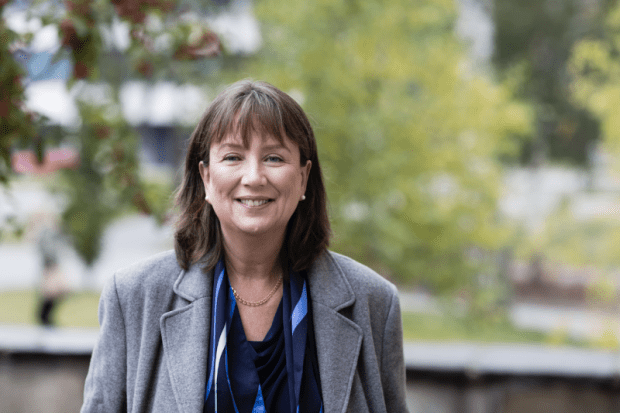Sigbritt Karlsson thinks academics might be easier to deceive than others. “You have a lot of education, you think you’re so smart, you can’t see through, and you don’t dare to ask the relevant question because, if you do that, you might show yourself as ignorant.”
The president of KTH Royal Institute of Technology is referring to a scandal that shook global academia and, in particular, her home nation of Sweden.
Swiss-born star surgeon Paolo Macchiarini worked at Sweden’s prestigious Karolinska Institute and gained global prestige when he claimed to have developed the world’s first synthetic organ transplant, replacing a patient’s windpipe with a plastic tube. Most of his patients died afterwards, and it emerged in the mid-2010s that he had misrepresented the success of his surgeries and the results of his research. In 2019, an Italian court sentenced Macchiarini to 16 months in prison for forging documents and abuse of office. In September 2020, he was charged in Sweden with aggravated assault.
THE Campus views: Boosting female representation in STEM is crucial to global innovation
Karlsson, a chemical engineer, says the revelations were like a “bomb” in the scientific community and seriously damaged public confidence in science in general. In the wake of the scandal, Sweden set up the National Board for Assessment of Research Misconduct and, partly thanks to the role of science in fighting the pandemic, trust has virtually recovered, she says.
Karlsson notes drily that as a polymer expert, she would have known that the plastic Macchiarini selected for his operations would not work. It’s a shame she did not peer-review his papers: “They could have asked me. I could have told them it was rubbish from the beginning.”
It reflects a drawback of siloed working, she says, pointing out that if polymer experts such as herself did not talk to environmentalists or political scientists, they would be unlikely to find the best answers to their problems. “In this case, he was a medical doctor and thought that he could just pick any material for that solution.”
Since then, Karlsson has been hyper-aware of the potential for research fraud, but she differentiates between the few researchers who purposely deceive and those who take shortcuts.
“That drive to cut corners comes from this huge focus on the number of scientific papers that you should have in order to be successful researchers,” she says. “I think we need to step back a little and talk about the quality of research rather than the quantity.”
At KTH, she is trying to look at quality rather than quantity when considering promotions, but she admits that it is complicated because “what does it mean, ‘quality’?”
Karlsson recognises that early career academics today have it harder than she did. “I think it has changed. It’s more pressure now than it used to be because I had time to develop as a researcher. It worked for me to combine family with a research career.”
She admits that her researchers sometimes complain of being like businesspeople because they spend so much time pursuing funding. Is she troubled by this? “I’m worried that we will lose talents because they don’t think our environment is good enough,” she says.
Failing to address gender equality
Born in Stockholm and the first in her family to attend university, Karlsson describes herself as stubborn – a useful trait considering that she is making little headway on one of the main tasks she set herself on becoming president of KTH.
When she took up the role in 2016, Karlsson made gender equality one of her top priorities. Yet the proportion of new female students at the technology- and engineering-focused institution has remained at 34 per cent every year since 2012.
“Sometimes I despair and wonder, what will we have to do in order to increase the number?” she asks. They have tried various tactics to improve the gender balance – including introducing a provocative slogan, “The future is too important to be left to men”, which incited accusations of sexism (Karlsson wryly observes on her blog that there have also been long queues for tote bags adorned with the slogan).
She is clear that the culture of technical universities needs to change, and she can cite examples of progress: one older male physics professor told her that they needed more women because otherwise they would not be attractive to members of younger generations, both male and female.
Karlsson has noticed that women favour degrees that are more overtly linked to practical outcomes and to tackling real-world questions, and enrolment on KTH’s new course on energy and the environment is nearly 50 per cent female. “Maybe one shouldn’t generalise, but women are more interested to see the usefulness of their education, to see that they can contribute,” she says.
One upshot of the male-dominated culture is that her female students are more dedicated. “The women who apply to us, they have thought a lot on why they chose us. The men think, ‘OK, I can always apply to KTH. I can always be an engineer’ – but they have not really thought it through.” As a result, men are also more likely to fail modules and to have to retake them, meaning they take longer to finish their degrees, she says.
Certain subjects at KTH are painfully low on women: just 19 per cent were studying computer science in 2020, below the global average of 23 per cent, according to data from the THE World University Rankings. However, other programmes are more evenly balanced between men and women – civil engineering and architecture, for example.
Some might argue that a portion of the criticism thrown at universities over gender imbalance should be redirected to schools, and even to parents. After all, by the time girls are 18 they have often already opted out of STEM subjects.
Karlsson thinks schoolchildren need a better grounding in maths and science. “If you look at children up to 10 years, or something like that, they’re equally interested in technical solutions and taking things apart. But somewhere around 10 years of age, girls and boys move apart. And there we lose a lot of the women because they don’t choose the subjects that make them prepared to go into STEM.
“If you’re 19 and you have a little bit of a weak background in mathematics, I don’t think you dare to continue into STEM,” she adds.
On this Karlsson, really has put her money where her mouth is. When her own children’s school decided to specialise in music, she told the head that it should specialise in maths and natural sciences instead. He told her to move her children to a different school. Perhaps unsurprisingly, her children all went to KTH and became engineers anyway, with extra support from their engineer mother.
Arts and tech
Sweden is famously excellent at technology and engineering. Recently, global tech giants such as Google have been touting the benefits of humanities graduates, and other famous technology institutions such as the Massachusetts Institute of Technology have upped their humanities offerings, citing the benefits for problem-solving. Does Karlsson think Sweden is putting enough emphasis on arts and humanities?
At KTH, she says, they recognise the importance of integrating the arts and humanities with more technical subjects. They teach environmental humanities, philosophy and social sciences, and students in more technical disciplines can pick up modules in these subjects.
But Karlsson also notes that Sweden punches way above its weight when it comes to global engineering and tech companies, citing Volvo, Ericsson and Scania. “Considering that we are maybe 8, 9 million [in population], it has served us well to have that focus on engineering.”
Immigration rules and brain drain
Last year, Sweden was accused of risking a brain drain when it introduced a new immigration law placing restrictions on granting permanent residency to international doctoral students.
Until recently, non-European Union doctoral students were eligible for a permanent residence permit if they had lived in Sweden for four of the previous seven years, setting them on the path to citizenship. However, this changed in July when laws to control asylum seeker numbers came into effect. Now, all non-EU foreign nationals seeking permanent residency must have either a permanent job or one lasting at least 18 months.
For Karlsson, it remains to be seen whether the move really will cause the brain drain some fear. People also cried alarm when Sweden introduced tuition fees for master’s degrees for non-EU international students, she says. “Everyone said: ‘This will be devastating for the universities, they will never come back,’ and things like that. But 10 years after, we are nearly back at the same figures that we had.”
She does note that the government was reacting to a large inflow of migrants in 2015 and “they haven’t thought through what it meant for talents”. She also believes it was unfair to move the goalposts for those PhD candidates already in the country.
When it comes to leading a university, Karlsson says she learned what not to do from others she has worked with throughout her career. “I have been close to people who are narcissistic, who use people for their own benefit, don’t acknowledge the things that other people do in the research group and things like that.”
Her style, in contrast, is to listen: “To be able to be flexible towards bringing on ideas from as many people as possible and not think that you are the only one who can present the solution.”
Quick facts
Born: Stockholm, 1958
Academic qualifications: MSc in chemical engineering and PhD in polymer technology, both from KTH Royal Institute of Technology
Lives with: Husband, her children are grown
Academic hero: Marie Curie
This is part of our “Talking leadership” series of 50 interviews over 50 weeks with the people running the world’s top universities about how they solve common strategic issues and implement change. Follow the series here.
The Times Higher Education Innovation & Impact Summit, in partnership with KTH Royal Institute of Technology, will take place 26-28 April. There is an early bird deadline until 11 March. Register here.
Register to continue
Why register?
- Registration is free and only takes a moment
- Once registered, you can read 3 articles a month
- Sign up for our newsletter
Subscribe
Or subscribe for unlimited access to:
- Unlimited access to news, views, insights & reviews
- Digital editions
- Digital access to THE’s university and college rankings analysis
Already registered or a current subscriber? Login









